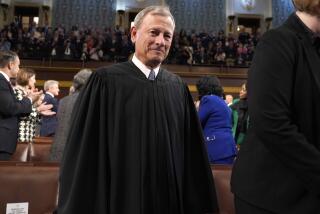Cranston Tells Ethics Panel He Can’t Testify : Thrifts: The senator’s attorney says he has been weakened by radiation therapy for prostate cancer.
- Share via
WASHINGTON — Sen. Alan Cranston (D-Calif.), suffering from advanced prostate cancer and scheduled for surgery later this month, indicated Tuesday he will not testify at Senate Ethics Committee hearings into the “Keating Five” affair.
Five weeks of radiation therapy have weakened and tired the senator, and he needs to rest before the surgery, Cranston’s attorney, William W. Taylor III, told the committee Tuesday.
Cranston waived his rights to participate personally in future hearings of the committee, which is investigating efforts by Cranston and four other senators on behalf of Charles H. Keating Jr., former owner of Lincoln Savings & Loan of Irvine.
The committee voted 6 to 0 to excuse Cranston from formal cross-examination, after special counsel Robert S. Bennett said enough material could be gleaned from hundreds of pages of depositions by Cranston in closed committee hearings.
“I believe that in Sen. Cranston’s case, the record is sufficiently complete that this committee can make a correct and informed judgment in this matter,” Bennett said.
On Jan. 21, Cranston is scheduled to undergo a relatively new surgical procedure in which nuggets of radioactive material will be inserted into the tumor through tiny tubes to deliver a killing dose of radiation to the cancer cells without damaging healthy cells. About one prostate patient a month has the operation at Stanford University Medical Center.
“Sen. Cranston’s tumor is somewhat larger and more advanced than many of our patients, but using this combination of treatment, he stands an excellent chance of returning to his robust, healthy lifestyle in the next few months with minimal chance of a recurrence,” Dr. Malcolm A. Bagshaw, Cranston’s doctor, said in a statement issued at Stanford.
The operation, known as interstitial hyperthemia, gives patients with prostate cancer a 70% chance of survival for a period of 10 years, according to Bagshaw, chairman of Stanford’s Department of Radiation Oncology.
Taylor, the attorney, said Cranston “expects to be fully back at work in the United States Senate before the end of February” and does not want to delay the Ethics Committee decision. Cranston has announced he will not seek reelection in 1992.
“Because of the side effects of the cumulative radiation, (Cranston) is unable to endure the stresses and strains of preparing for and delivering oral testimony at this time,” Taylor told the committee.
Cranston appeared before the committee when it began hearings in November, declaring in an impassioned statement that he had done nothing wrong in his dealings with Keating.
The controversial thrift operator gave $1.3 million to the campaigns and causes of the five senators. Cranston received the most: $850,000 for voter registration campaigns he promoted; $85,000 for the California Democratic Party and $39,000 for his 1986 reelection campaign.
The Ethics Committee is trying to determine whether Cranston and his four colleagues transgressed ethical standards in their dealings with federal regulators on behalf of Lincoln. Although Lincoln suffered from financial problems because of dubious loans and risky investments as far back as 1986, it was not seized by regulators until April, 1989. Its failure will cost taxpayers an estimated $2 billion, the highest price tag among hundreds of S&L; collapses in recent years.
The committee has the power to exonerate the senators of wrongdoing or recommend that the Senate impose some form of censure.
One committee member, Sen. Trent Lott (R-Miss.), said Tuesday that at least one of the five senators will be brought before the full Senate for a possible vote of censure. Although he did not indicate which senator would be involved, it was the first time that a member of the committee has predicted that the investigation may produce serious punishment.
Lott said the Ethics Committee was taking too long in its deliberations. “We just let it kind of drift along,” he said.
The committee has finished its cross-examination of Sens. John McCain (R-Ariz.), John Glenn (D-Ohio), and Donald W. Riegle Jr. (D-Mich.). A fourth, Sen. Dennis DeConcini (D-Ariz.), will be questioned today.
In Tuesday’s testimony, Sen. Jesse Helms (R-N.C.) sharply challenged Riegle about his 1987 visit to the Phoenix headquarters of Lincoln’s parent company, American Continental Corp.
Staff writer Norma Kaufman in San Francisco contributed to this story.
More to Read
Get the L.A. Times Politics newsletter
Deeply reported insights into legislation, politics and policy from Sacramento, Washington and beyond. In your inbox twice per week.
You may occasionally receive promotional content from the Los Angeles Times.








